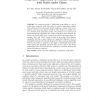Free Online Productivity Tools
i2Speak
i2Symbol
i2OCR
iTex2Img
iWeb2Print
iWeb2Shot
i2Type
iPdf2Split
iPdf2Merge
i2Bopomofo
i2Arabic
i2Style
i2Image
i2PDF
iLatex2Rtf
Sci2ools
NETWORKING
2008
2008
Cooperative Replication in Content Networks with Nodes under Churn
In content networks, a replication group refers to a set of nodes that cooperate with each other to retrieve information objects from a distant server. Each node locally replicates a subset of the server objects, and can access objects stored by other nodes at a smaller cost. In a network with autonomous nodes, the problem is to construct efficient distributed algorithms for content replication that decrease the access cost for all nodes. Such a network also has to deal with churn, i.e. random "join" and "leave" events of nodes in the group. Churn induces instability and has a major impact on cooperation efficiency. Given a probability estimate of each node being active that is common knowledge between all nodes, we propose in this paper a distributed churn-aware object placement algorithm. We show that in most cases it has better performance than its churn unaware counterpart, increases fairness and incites all nodes to cooperate. Key words: content networks, repli...
Autonomous Nodes | Churn Induces Instability | Computer Networks | Content Networks | NETWORKING 2008 |
| Added | 29 Oct 2010 |
| Updated | 29 Oct 2010 |
| Type | Conference |
| Year | 2008 |
| Where | NETWORKING |
| Authors | Eva Jaho, Ioannis Z. Koukoutsidis, Ioannis Stavrakakis, Ina Jaho |
Comments (0)

